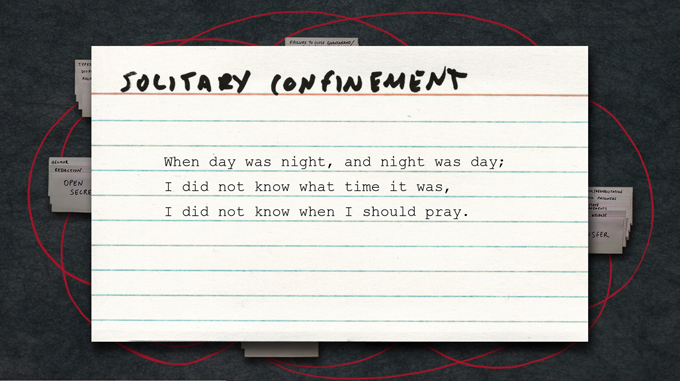
Mariam Ghani and Chitra Ganesh, Screenshot of The Guantanamo Effect, 2013
This past summer, 30,000 prisoners at Pelican Bay and other California state prisons organized a hunger strike to protest extended solitary confinement. For years, sometimes even decades, Pelican Bay inmates remain completely isolated for 22 to 24 hours per day and are denied all forms of contact with the outside world, in clear violation of international human rights standards. Perhaps it is not so surprising, then, that the prisoners at Pelican Bay cited the ongoing hunger strike at Guantanamo Bay as an inspiration for their latest wave of organizing. Meanwhile, Guantanamo prisoners have said they were inspired by hunger strikes undertaken by prisoners’ rights movements in the United States and Ireland, among other places.
For this podcast, we trace a series of similar connections with human rights lawyers Alexis Agathocleous and Ramzi Kassem in order to suggest that activists should follow policymakers in imagining “domestic” and “foreign” struggles as a single continuum, rather than as separate spheres. Agathocleous and Kassem have been at the forefront of legal advocacy around civil liberties and prisoners’ rights for much of the last decade, and each brings a unique perspective to the current debate. As part of his work with the Center for Constitutional Rights, Agathocleous represents a group of Pelican Bay prisoners who have been held in solitary confinement for a dozen years or more, while Kassem represents some of the Guantanamo prisoners who have been cleared for transfer since 2009 but are still under an executive hold.
Our conversation focuses on intersections between the two lawyers’ work on these cases and others, ranging from the political uses of prison Communication Management Units to the chilling effects of covert NYPD surveillance of Muslims. Agathocleous and Kassem have for years collaborated with us on various Index of the Disappeared projects, such as “The Guantanamo Effect,” providing legal and research insights. For this discussion, the four of us reflect on lessons learned over a decade of sustained engagement—specifically the critical importance of staging simultaneous interventions in legal, political and artistic spheres.

